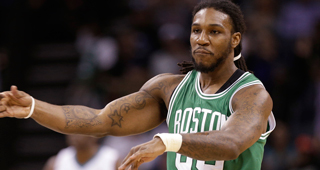While Isaiah Thomas was the Boston Celtics’ lone All-Star last month, a recent injury to Jae Crowder has revealed who is truly the team’s most valuable player. Crowder left a 102-98 loss to the Houston Rockets on March 11 with a sprained right ankle and the Celtics have struggled in his absence.
Since Crowder left with 8:21 remaining in the third quarter of the Houston game, the Celtics have a minus-nine point differential; a margin that stood at -33 before back-to-back wins against the Philadelphia 76ers and Orlando Magic.
Crowder has a real plus-minus of 3.88, good for 20th in the NBA and easily the best mark on the Celtics. ESPN’s plus-minus figures also credit him with providing 9.67 wins to his club, nearly three more than any other teammate.
In a little more than a year since he was acquired from the Mavericks, Crowder has become Brad Stevens’ best all-around player. As critical as Thomas’ scoring is to the Celtics, he struggles defensively. He has the worst defensive rating (107) of any member of Boston’s regular rotation. The importance of Crowder’s defense, both individually and as part of the team concept, has been exposed immediately.
The timing of his ankle injury couldn’t have been worse with the Celtics scheduled to face the Indiana Pacers, Oklahoma City Thunder and Toronto Raptors over a three-game-in-four-nights stretch beginning last Tuesday.
Often drawing the most difficult defensive assignment, or sharing it with Avery Bradley, Crowder has held opponents to 43.1% shooting this season -- including just 30% from three. With Crowder injured, Stevens has had to lean on Marcus Smart, Evan Turner and Bradley. The Celtics went unconventional and started Smart at small forward against Indiana and Oklahoma City before slotting Turner into Crowder’s spot over the last three games.
One of the main concerns for the Celtics without Crowder is defending the three-point line, which can be an issue for Smart against much taller wings. Crowder’s 30 DFG% ranks fifth in the NBA among those that defend at least four attempts per game. He’s only a few percentage points behind elite defenders Draymond Green and Paul George, while also trailing Monta Ellis (what?) and Durant (27.6%).
The Celtics have allowed opponents to shoot 39.8% from three in their last five games. At the time of Crowder’s injury, they ranked first in three-point defense (32.5%) -- they’ve since dropped to fourth overall (33.1%).
There are only 26 players in the league hitting threes at or above the rate Boston has allowed them over the last week. They have essentially let every shooter become a facsimile of Kyle Korver, Mirza Teletovic or J.R. Smith.
As troublesome as the Celtics’ three-point defense has become, the immediate concern after Crowder went down was how they would handle three consecutive games against All-Star perimeter players. They lost all three games, but Stevens employed respectable plans against George, Durant and DeRozan.
George is shooting just 41.1% this season, but was at 56.3% against the Celtics. In his three previous games against Boston this season, George went 8-for-18 (Nov. 4), 10-for-22 (Nov. 11) and 7-for-20 (Jan. 13). Crowder averaged 32 minutes per game in those contests.
The Thunder went to Durant early and often to great success with Smart starting on him, but an easy victory allowed him to function as a playmaker more than scorer in the second half.
“Everybody has a vulnerability against Kevin Durant,” Stevens explained. “We all saw Russell Westbrook; he’s the fastest guy in the league, probably. Maybe [John] Wall, but at the end of the day those guys are elite, elite athletes and you are going to have to adjust to them. You come in with a gameplan, sometimes it feels great and sometimes it doesn’t.”
A 50.8% shooter for the season, Durant finished 9-for-19, which represents a pretty good defensive performance. After the first six minutes of the game he missed eight of his 13 shots.
Similarly to Durant, DeRozan became less of a threat when Toronto built a sizeable lead and Kyle Lowry took over. He attempted just 14 shots -- making six -- and was held below his 44.4% season percentage.
The Celtics haven’t surrendered a 40-point game, but their inability to defend the three and keep teams off the offense glass has led to some poor overall defensive performances. Teams have collected 25.7% of available offensive rebounds against the Celtics this season, but that figure has spiked to 27.7% over the last week.
Boston has the NBA’s fourth-best defensive rating (103.3), but surrendered ratings of 107.7 (IND, +3.6 over season mark), 132.9 (OKC, +20), 114.1 (TOR, +4), 105.7 (PHI, +6.8) and 99.2 (ORL, 103.8, -4.6) over the last week.
With games against the Raptors, Los Angeles Clippers and Golden State Warriors over the next 10 days, the Celtics have to figure out how to defend without their linchpin or hope Crowder returns ahead of schedule.
“Obviously, we miss Jae, we love having Jae and we want him to be healthy and back, but we have to play well without him,” Stevens said. “There should be no excuses.”
With five losses in their last eight games, the Celtics have lost their grip on homecourt advantage in the first round of the postseason and will continue to struggle until Crowder returns.



